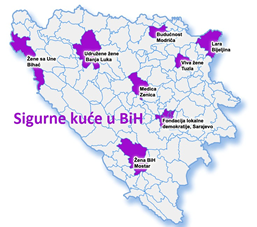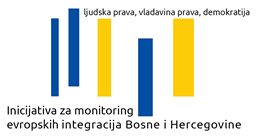Initiative to declare 12th September as the Women’s Rights Day in BiH

Photo: www.kaportal.hr
Women’s Network BiH, an informal group of civil society organizations and individuals that represent and work on women’s rights and encourage gender equality, who promote antidiscrimination, freedom in decision-making, equality, antimilitarism and nonviolence, and accept feminist values of peace, solidarity, fellowship, equality and diversity, has felt a need and responsibility to send a letter to Ministry of Civil Affairs of BiH, Ministry of Human Rights and refugees of BiH and to the Council of Ministers of BiH asking that these institutions declare 12th September as the Day of women’s rights in BiH.
This day should be celebrated every year and it should help in increasing awareness of women’s rights and problems which women in BiH must face everyday. Members have came to an agreement that 12th September should be that day, because that is when the WNBiH was established in 2009 on a conference with the same name and within fourth PitchWise festival of women’s art and activism.
On the occasion of the first informal celebration of Women’s rights Day in BiH , 12th September 2014. Women’s network BiH wants to draw public’s attention on the condition of women’s rights and gender equality in BiH. Women’s Network BiH also wants to show all those areas of this right that should be improved and which are very important for future progress of Bosnia and Herzegovina.
Women in BiH, inter alia, are subjects of discrimination in access to social and economic rights, especially in employment and in access to maternity leave and maternity benefits. Achieving rights to maternity leave and standardization of benefits between cantons and entities is making women’s position on the job market harder. Percentage of violence against women is also alarming. Research of Agency for gender equality BiH from last the year shows that 47,2 % of women have experienced some kind of violence during their life after the age of 15. Punishments for acts of violence against women, especially domestic violence are still very mild. There were paroles, fine punishments, but prison punishments are rare. Women who are victims of violence are exposed to additional victimization. Violation of other women’s rights such as: right to work, right to take care of children, right to housing and access to justice is quite often. Position of Roma women is very difficult in BiH society and there has been no progression in last few years. About 90% of Roma women have no access to health insurance , social protection or employment. Women with disabilities are subjects of discrimination on daily bases, as women and as persons with disabilities. Health insurance is problematic area, especially protection of reproductive health, care and protection of pregnant women. Despite the fact that there are no appropriate tables for medical checkups for women in wheelchairs, most of health workers are not trained to work with persons with disabilities. Bosnian authorities are neglecting presence of LBT women, ignoring their presence in society. Percentage of women in legislative and executive powers in all levels is unsatisfying and quota of 40% has not been achieved yet.
In order to improve women’s rights and gender equality in BiH, Women’s Network BiH calls for the issues of maternity rights and maternity benefits to be resolved, which should be treated within the social security system, and not as the measure of social protection, as it is now. It is necessary to ensure adequate and continuous financing of safe houses to house victims of domestic violence, through budgets of cantons and entities and to establish system for monitoring of all the cases of violence against women on the whole territory of Bosnia and Herzegovina. It is necessary to implement law and other measures in order to improve employment of women, and also necessary measures of harmonization of private and public activities of women (parental rights, affordable children’s nursery, extended stay for school-age children).








